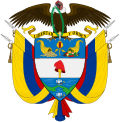Background
After taking office in August 2002, President Álvaro Uribe put forward several constitutional reforms. The Congress approved the proposals on 20 December 2002, but also suggested several changes, including reducing the size of the Chamber of Representatives and the Senate by a fifth rather than creating a unicameral Congress, and forcing parties that received less than 2% of the vote in elections to disband.
Uribe subsequently signed the changes into law, and they were submitted to the Constitutional Court on 22 January 2003. On 9 July the Court passed judgement that the referendum was valid, but that four questions were not acceptable.
Under articles 374 and 378 of the Constitution, proposed amendments to the constitution require a quorum of 25% of registered voters casting a valid vote, and a majority of those who have voted to vote in favour. [1]
This page is based on this
Wikipedia article Text is available under the
CC BY-SA 4.0 license; additional terms may apply.
Images, videos and audio are available under their respective licenses.
